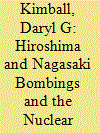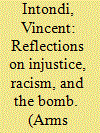|
|
|
Sort Order |
|
|
|
Items / Page
|
|
|
|
|
|
|
| Srl | Item |
| 1 |
ID:
173027


|
|
|
|
|
| Summary/Abstract |
As the site of the first atomic bomb attack, Hiroshima has served as a vital center for education about nuclear weapons and their effects. The people of the city, along with those of Nagasaki, have been steadfast in their advocacy for abolishing nuclear weapons. The survivors of the U.S. atomic bombings on Japan, the hibakusha, have worked to communicate their experience to global citizens and leaders. Kazumi Matsui, Hiroshima’s mayor since 2011, has played a major role in that effort. He serves as president of Mayors for Peace, an assembly of thousands of cities worldwide devoted to protecting cities from the scourge of war and mass destruction.
|
|
|
|
|
|
|
|
|
|
|
|
|
|
|
|
| 2 |
ID:
173025


|
|
|
|
|
| Summary/Abstract |
If there ever has been a fantastical national security goal, ridding the world of all nuclear weapons would be near the top of the list. At the height of the Cold War, the United States and Russia possessed a combined total of 68,000 of these most deadly armaments and although there have been significant reductions over the years, the two countries still account for an estimated 91 percent of the world’s nuclear weapons, which total more than 13,000 warheads.
|
|
|
|
|
|
|
|
|
|
|
|
|
|
|
|
| 3 |
ID:
173030


|
|
|
|
|
| Summary/Abstract |
The U.S. atomic bomb attack on the people of Hiroshima at 8:15 a.m. on August 6, 1945, and the second attack on the city of Nagasaki at 11:02 a.m. on August 9 killed and wounded hundreds of thousands of unsuspecting men, women, and children in a horrible blast of fire and radiation, followed by deadly fallout. In years that followed, those who survived—the hibakusha—suffered from the trauma of the experience and from the long-term effects of their exposure to radiation from the weapons.
|
|
|
|
|
|
|
|
|
|
|
|
|
|
|
|
| 4 |
ID:
173024


|
|
|
|
|
| Summary/Abstract |
Seventy-five years ago, on July 16, the United States detonated the world’s first nuclear weapons test explosion in the New Mexican desert. Just three weeks later, U.S. Air Force B-29 bombers executed surprise atomic bomb attacks on the cities of Hiroshima and Nagasaki, killing at least 214,000 people by the end of 1945, and injuring untold thousands more who died in the years afterward.
|
|
|
|
|
|
|
|
|
|
|
|
|
|
|
|
| 5 |
ID:
173029


|
|
|
|
|
| Summary/Abstract |
Seventy-five years ago, the United States tested the first nuclear weapon in New Mexico and then used one to destroy Hiroshima and another to destroy Nagasaki. As devastating as they were, those atomic bombs were small by today’s standards, each exploding with just a tenth of the explosive yield of typical warheads now deployed on missiles, submarines, and planes by a handful of countries. Fortunately, no nuclear weapons have been used in combat since the bombings in Japan, but the risk of nuclear war ebbed and flowed throughout the Cold War. It has been increasing in the past three years. The United States and Russia have abandoned long-standing nuclear arms control treaties, started to develop new kinds of nuclear weapons, and expanded the circumstances in which they might use nuclear weapons. However a nuclear exchange might start, it could quickly escalate from a local disaster into a global catastrophe.
|
|
|
|
|
|
|
|
|
|
|
|
|
|
|
|
| 6 |
ID:
173026


|
|
|
|
|
| Summary/Abstract |
The moment in August 2005 is seared into my memory. The train pulled up to the Hiroshima station from Kyoto. I stepped out with my mind full of images from 60 years ago, when the United States dropped the first atomic bomb on this pristine city of 340,000 people. (Hiroshima had been one of the few cities that escaped the fire-bombing campaign of Japan’s major cities led by U.S. Air Force General Curtis LeMay.) Initially, I was taken aback by what I saw: a modern city, filled with restaurants, hotels, shops, and lots of people, much like any other in the industrialized world.
|
|
|
|
|
|
|
|
|
|
|
|
|
|
|
|
| 7 |
ID:
173028


|
|
|
|
|
|
|
|